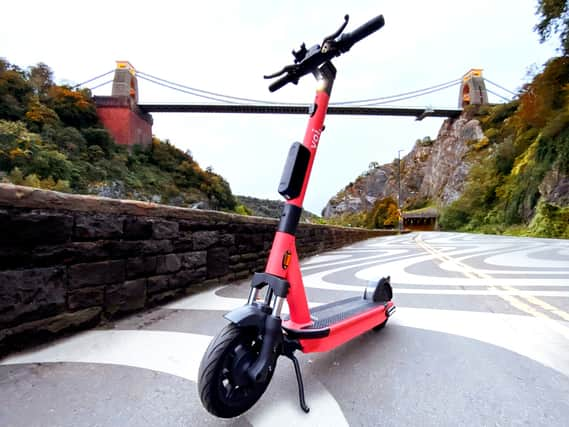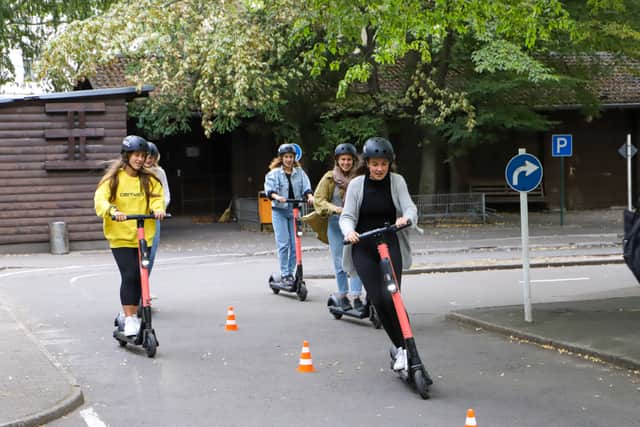‘The real problem lies with cars’ - Voi boss on year-long scooter trial in Bristol


But with the scheme viewed as controversial and even dangerous by some, what’s the likelihood that e-scooters will become a permanent fixture in Bristol’s transport system?
As the trial nears completion, BristolWorld spoke to Voi’s UK and Ireland general manager Jack Samler to find out if ‘micromobility’ is here to stay - and why he thinks we should be ‘re-framing the debate’ around how we move.
Advertisement
Hide AdAdvertisement
Hide AdJust to recap - the trial launched at the end of October 2020, starting with small central areas which have gradually been expanded as people got used to seeing e-scooters on the streets.
Bristol is one of 17 towns and cities where the e-scooters are being trialled up and down the country and, in January, became one of the first places in the UK along with the West of England region to offer residents Voi’s long-term rental scooters.
‘2.3 million car trips saved’
It’s been a ‘really positive’ 12 months, said Jack, with ‘exponential growth in take-up of the service and, as part of that, user appetite’.
“Over the course of the year, we have recorded more than six million rides, 600,000 different users and more than 15 million kilometres travelled,” he told BristolWorld.
Advertisement
Hide AdAdvertisement
Hide Ad“We’re seeing in the West of England region and in Bristol specifically similar if not even more positive trends. We’ve seen more than two million rides in Bristol alone, the equivalent of around 3.5 million miles ridden.
“What’s exciting is that not only are people using the service more and more frequently each month, we’re witnessing a genuine mobile shift. This means that people are getting out of their cars and using e-scooters as a way to fill the gap in short-form journeys.
“From our surveys, we’ve calculated that 39 per cent of trips on Voi e-scooters are directly replacing trips that would have happened in cars. On a national level, that means about 2.3 million car trips have been saved.
“That’s the equivalent of about 1,200 tonnes of carbon emissions that would have been released into the atmosphere.”
Safety concerns
Advertisement
Hide AdAdvertisement
Hide AdDespite these glowing figures e-scooters, as with all road vehicles, are not wholly without risk.
In September, two men were filmed riding an e-scooter down the M32. And earlier this month, a Bristol mum claimed an e-scooter collided with her while she was pushing a pram across the pedestrian crossing near Gaolferry Bridge.
Opposition councillors at Bristol City Council have called for the trial to be dropped, questioning the positive impact the e-scooters have on the environment and stating there would be ‘chaos’ on the city’s roads were they to be made permanent.
Advertisement
Hide AdAdvertisement
Hide AdJack added: “Regarding safety concerns, first of all it’s important to distinguish between the Voi e-scooters and those that are privately-owned.
“Confusingly, privately-owned e-scooters are legal to buy but illegal to ride on public land, whereas e-scooters operated by Voi and other rental schemes are legal under Government trials being run at the moment.
“To put it into numbers, we work closely with Avon and Somerset Police who have been tracking and measuring incidents relating to both Voi and private e-scooters- their analysis shows that 94 per cent involved private scooters.


“When you consider the number of rides by Voi, this skew towards private e-scooters in terms of safety tells its own story.
Advertisement
Hide AdAdvertisement
Hide Ad“It’s worth taking into account the various safeguarding procedures and restrictions that come with a Voi e-scooter - whether that’s the fact we have numberplates that allow us to track users or that we impose speed restrictions along with geo-fencing technology that means users cannot ride in or have to ride below a certain speed in certain areas.
“You can’t just rock up to a Voi e-scooter - you must be at least 18-years-old and hold a provisional driving licence. We also run an online traffic school and in-person safety events, and incentivise helmets by offering free rides to users who wear them.”
‘The conversation needs to be framed with an eye towards the future’
But Jack went on to say that safety issues ‘risk being viewed via the wrong prism’ and that it’s time to ‘re-frame the debate’ over e-scooters in light of the climate crisis.
“E-scooter users are vulnerable road users, just like cyclists and pedestrians, and don’t face any significantly higher risk than those methods of transport,” he said. “They’re certainly less risky than a motorcycle rider.
Advertisement
Hide AdAdvertisement
Hide Ad“The real problem lies with cars and other heavy-form transport that, ultimately, can’t be the future. A hefty amount of carbon emissions are caused each year by cars, and right now road space is prioritised towards cars.
“What we need to focus on is how can we make scooter riders, cyclists and walkers feel safer and, as part of that, invest in infrastructure and cycle lines when we have faster and much more dangerous heavy-form transport on the roads.
“The conversation needs to be framed with an eye towards the future and being visionary. If we bog down the debate in the day-to-day, ie. how we’re operating a smart and safe service, we risk missing the bigger picture.
“And that bigger picture is air pollution - a huge environmental threat to the UK, which causes around 28,000 to 38,000 deaths per year.
Advertisement
Hide AdAdvertisement
Hide Ad“We are in a crisis. We need to be bold and re-think the way that we move, that’s a simple fact.
“E-scooters can be a part of that. A big percentage of the rides we’re seeing are connecting public transport locations together - for instance, where there might be black holes between train stations.
“The e-scooters are being used to commute to work and undertake errands such as grocery shopping, encouraging and stimulating economic activity.
“Although our oldest user is over 80, users do lean towards a younger demographic, so between 20 and 35-years-old.
Advertisement
Hide AdAdvertisement
Hide Ad“What is exciting is we’re delaying or even preventing this generation from car ownership. We’re offering a different form of transport which nips the need for cars in urban areas in the bud from the off.”
What’s next?
Currently, there is no further information on what will happen when the trial reaches conclusion at the end of October.
Bristol mayor Marvin Rees, who has praised the scheme as an ‘overwhelming success’, along with metro mayor of the West of England Dan Norris have both called for the trial to be extended.
Jack added: “We’re confident that our position is strong and that we’re becoming engrained in the transport eco-system of Bristol along with other major UK cities.
“We think that the trials should be extended. We know that’s what our users want.
“But it’s a Government decision and one we can’t comment on just at the moment.”
Comment Guidelines
National World encourages reader discussion on our stories. User feedback, insights and back-and-forth exchanges add a rich layer of context to reporting. Please review our Community Guidelines before commenting.